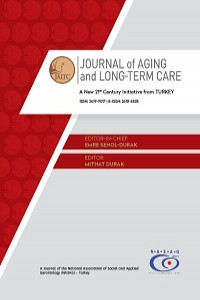The effect of GeroAtlas60+ Refresher University in preserving individual and community health
The effect of GeroAtlas60+ Refresher University in preserving individual and community health
GeroAtlas60 + Refresher University is Turkey’s first university for older adults based on theoretical assumptions and concepts. The University was founded as a response from the field of gerontology to support modern society’s expectation for longer and healthier lives. If the quality of life is defined as older adults’ feeling good about themselves in old age or until the end of their lives despite their physical, psychological, and social problems, one of the first questions that arise is how to provide this quality of life. GeroAtlas60 + Refresher University is a gerontological approach to this objective using a ‘lifelong learning’ model. The two-dimensional theoretical and practical curriculum provides older adults with knowledge related to their needs and also helps both genders to acquire new skills and competencies such as participation in cooking and knitting courses by males and study of home improvement and Do-it-Yourself (DIY) home repair and maintenance courses by females. Activating older adults’ knowledge and skills in the mental, physical, and social realms offers the potential for enhancing the quality of life outcomes.
Keywords:
Learning Health, Disease, Aging, Old Age, Older Adults, Rational Action Theory,
___
- Bower, G. H., & Hilgard, E. R. (1981). Theories of Learning. Englewood, Cliffs.
- Braun, N., & Gautschi, T. (2011). Rational-Choice-Theorie . Weinheim, München: Juventa Verlag.
- Flury, J. (2004). Berufe im Gesundheitswesen. G. Kocher, & W. Oggier, In Gesundheitswesen Schweiz 2004-2006: Eine aktuelle Übersicht (s. 36-42). Bern, Göttingen, Toronto, Seatle: Huber.
- Gadamer, H.-G. (1993). Über die Verborgenheit der Gesundheit. Frankfurt/Main: Fischer.
- Häussler, B., Paquet, R., & Preuß, K.-J. (2004). Jahrbuch der medizinischen Innovationen, Band 1: Fortschritt im Gesundheitswesen von morgen. Stuttgart: Schattauer.
- Hirschle, J. (2015). Soziologische Methoden: Eine Einführung. Weinheim Basel: Beltz Juventa.
- Jordan, D., & Enderle, M. (2004). Apotheken und Drogerien. G. Kocher, & W. Oggier, In Gesundheitswesen Schweiz 2004-2006: Eine aktuelle Übersicht (s. 11-29). Bern, Göttingen, Toronto, Seatle: Huber.
- Kruse, A., & Wahl, H.-W. (2010). Zukunft Altern: Individuelle und gesellschaftliche Weichenstellungen. Heidelberg: Spektrum.
- Kunz, V. (1997). Theorie rationalen Handelns: Konzepte und Anwendungsprobleme. Opladen: Leske+Budrich.
- Laslett, P. (1996). A fresh map of life: The emergence of the third age. London: Palgrave Macmillan.
- Mason, R; & Randall, S. (1997). Education policy for an ageing society. In A. Borowski & E. Ozanne (Eds.), Ageing and social policy in Australia. Melbourne: Cambridge University.
- Meyer, P., & Zumbrunn, A. (2004). Freiwilligenarbeit und Verwandtenpflege. G. Kocher, & W. Oggier, In Gesundheitswesen Schweiz 2004-2006: Eine aktuelle Übersicht (s. 53-55). Bern, Göttingen, Toronto, Seatle: Huber.
- Nutbeam, D. (2000). Health literacy as a public health goal: A challenge for contemporary health education and communication strategies into the 21st century, Health Promotion International.
- Ostermann, B. M. (2002). Lernen. R. Pousset, In Altenpflege kompakt: Schlüsselbegriffe der Ausbildung und Praxis (s. 296-299). Weinheim, Basel: Beltz.
- Schaal, S., Kunsch, K., & Kunsch, S. (2016). Der Mensch in Zahlen: Eine Datensammlung in Tabellen mit über 20000 Einzelwerten, 4.Aufl. Berlin, Heidelberg: Springer, Spektrum.
- Somaini, B. (2004). Gesundheitsförderung und Prävention, Public Health. G. Kocher, & W. Oggier, In Gesundheitswesen Schweiz 2004-2006: Eine aktuelle Übersicht (s. 65-75). Bern, Göttingen, Toronto, Seatle: Huber.
- Sporbeck-Hörning, P. (1996). Die neue Selbstdiagnose - Handbuch der Gesundheit (Tercüme) (örijinal: Family Medical Guide, 1995, Dorling Kindersley, London). München: Mosaik.
- TÜİK (Başbakanlık Türkiye İstatistik Kurumu) (2000).Türkiye Nüfus İstatsitikleri. Ankara: TÜİK.
- TÜİK (Başbakanlık Türkiye İstatistik Kurumu) (2005).Türkiye Nüfus Istatistikleri. Ankara: TÜIK.
- TÜİK (Başbakanlık Türkiye İstatistik Kurumu) (2010). Türkiye Nüfus Istatistikleri. Ankara: TÜIK.
- TÜİK (Başbakanlık Türkiye İstatistik Kurumu) (2015).Türkiye Nüfus İstatsitikleri. Ankara: TÜİK.
- Tufan, İ. (2007). Birinci Türkiye Yaşlılık Raporu. Antalya: GeroYay.
- Tufan, İ. (2015). Türkiye’de Yaşlılığın Yapısal Değişimi. . İstanbul: Koç Üniversitesi Yayınları.
- Tufan, İ. (2016a). Antikçağdan Günümüze Yaşlılık ve Yaşlanma, Geliştirilmiş 2.Baskı. İstabul: Nobel.
- Tufan, İ. (2016b). Bakıma Muhtaç: Türkiye’de Alzheimer Hastası Yaşlı İnsanların Bakımı. İstanbul: Koç Üniversitesi Yayınları.
- Weidenmann, B. (1995). Lernen-Lerntheorie. D. Lenzen, In Pädagogische Grundbegriffe, Band 2: Jugend bis Zeugnis (s. 996-1010). Reinbek bei Hamburg: Rowohlts Enzyklopädie.
- ISSN: 2619-9017
- Başlangıç: 2017
- Yayıncı: Ulusal Sosyal ve Uygulamalı Gerontoloji Derneği
Sayıdaki Diğer Makaleler
The effect of GeroAtlas60+ Refresher University in preserving individual and community health
İsmail TUFAN, Sevnaz SAHİN, Melis OKTUG ZENGİN, Melike TAMER KOSE, Martin PALLAUF, Eva SCHULC
Community centers of local governments for retirees: The case of Istanbul
Reducing social isolation and improving the quality of life in older adults
Su Hsien CHANG, Ching-len YU, Mei-chen CHEN
The characteristics and life preferences of Turkish older adults
